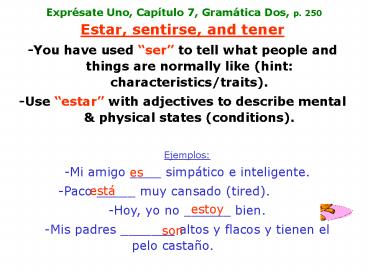Exprsate Uno, Captulo 7, Gramtica Dos, p' 250 - PowerPoint PPT Presentation
1 / 11
Title:
Exprsate Uno, Captulo 7, Gramtica Dos, p' 250
Description:
... set the table until (hasta que) I take the enchiladas out of the oven. -No pongas la mesa hasta que (yo) saco las enchiladas del horno. Negative informal commands ... – PowerPoint PPT presentation
Number of Views:35
Avg rating:3.0/5.0
Title: Exprsate Uno, Captulo 7, Gramtica Dos, p' 250
1
Exprésate Uno, Capítulo 7, Gramática Dos, p. 250
- Estar, sentirse, and tener
- -You have used ser to tell what people and
things are normally like (hint
characteristics/traits). - -Use estar with adjectives to describe mental
physical states (conditions).
- Ejemplos
- -Mi amigo ____ simpático e inteligente.
- -Paco _____ muy cansado (tired).
- -Hoy, yo no ______ bien.
- -Mis padres _______ altos y flacos y tienen el
pelo castaño.
es
está
estoy
son
2
- sentirse (e?ie) - to feel
- yo me siento
nosotros(as) nos sentimos - tú te sientes vosotros(as) os
sentís - Ud., él, ella se siente Uds.,
ellos, ellas se sienten - -Like estar, sentirse can be used with
adverbs (bien, mal) or with adjectives
(fantástico, fenomenal, estupendo, contento,
triste, feliz) to describe mental physical
states.
3
- sentirse (e?ie) - to feel
- yo me siento
nosotros(as) nos sentimos - tú te sientes vosotros(as) os
sentís - Ud., él, ella se siente Uds.,
ellos, ellas se sienten - -How are you feeling today?
- -Cómo te sientes hoy?
- -I feel nervous because I have a test.
- -(Yo) me siento nervioso(a) porque tengo un
examen.
4
- -The following expressions use tener with a
noun (not an adjective) to describe mental or
physical states. - tener frío to be cold
- tener calor to be hot
- tener miedo to be scared
- tener sueño to be sleepy
- tener sed (fem.) to be thirsty
- tener hambre (fem.) to be hungry
TENER BAG
Qué está en tu bolsa?
5
- tener frío to be cold
- tener calor to be hot
- tener miedo to be scared
- tener sueño to be sleepy
- tener sed (fem.) to be thirsty
- tener hambre (fem.) to be hungry
- Ejemplos
- -Its noon, and I am really (mucha) hungry.
- -Es mediodía (son las doce), y (yo) tengo mucha
hambre. - -Its really hot today. I would like a glass of
water because Im hot and thirsty. (el
tiempopágina 102) - -Hace mucho calor hoy. Quisiera un vaso de agua
porque tengo calor y (tengo) sed.
6
Exprésate Uno, Capítulo 7, Gramática Dos, p. 252
- Negative informal commands
- -An affirmative command tells someone what to do.
The affirmative informal command form of most
verbs is the tú form without the final s. - Ejemplo
- -Eat vegetables and sleep for (por) 8 hours.
- -Come (las) verduras y duerme por ocho horas.
- -Te acuerdas las formas irregulares?
- -Tener (to have) ten
- -Venir (to come) ven
- -Poner (to put) pon
- -Ir (to go) ve
- -Ser (to be) sé
- -Hacer (to do,make) haz
- -Salir (to go out,leave) sal
7
- Negative informal commands
- -A negative command tells someone not to do
something. To form the negative informal command
of most ar verbs, drop the final -o of the
yo form and add -es. - (Hint think opposite ending -as switches to
-es.) - Ejemplos
- -Dont smoke (fumar)!
- -No fumes!
- -Dont eat a lot of candies/sweets (dulces).
- -No tomes muchos dulces.
8
- Negative informal commands
- -A negative command tells someone not to do
something. To form the negative informal command
of most er -ir verbs, drop the final -o of
the yo form and add -as. - (Hint think opposite ending -es switches to
-as.) - Ejemplos
- -Dont come to the party early.
- -No vengas a la fiesta temprano.
- -Dont sleep in class.
- -No duermas en (la) clase.
- -Dont set the table until (hasta que) I take the
enchiladas out of the oven. - -No pongas la mesa hasta que (yo) saco
las enchiladas del
horno.
9
- Negative informal commands
- -These verbs have irregular negative informal
commands. - Dar no des
- Ir no vayas
- Ser no seas
- Estar no estés
- Ejemplos
- -Dont be negative. Be positive.
- -No seas negativo(a). Sé positivo(a).
- -Dont go to the store. I have lots of milk in
the fridge. - -No vayas a la tienda (al supermercado).
Tengo mucha leche en el
refrigerador.
10
Exprésate Uno, Capítulo 7, Gramática Dos, p. 254
- Object/reflexive pronouns with commands
- -D.O. pronouns and reflexive pronouns are
attached to the end of affirmative commands
(dangled onto the end). A written accent marks
goes over the third-to-last syllable. - Clap your hands, go back three.
- Ejemplos
- -Take a bath and get dressed.
- -Báñate y vístete.
- -Where are your shoes? Put them in your room
please. - -Dónde están tus zapatos?
Ponlos en tu cuarto
(habitación) por favor.
11
- Object/reflexive pronouns with commands
- -D.O. pronouns and reflexive pronouns go in
between no and the verb in negative
commands. - (Pronouns cannot be attached to a negative
command-they must go before the negative
command.) - Ejemplos
- -The book is awful. Dont read it.
- -El libro es pésimo/horrible/terrible/muy malo.
- (La novela es pésima/horrible/terrible/muy mala.)
- No lo/la leas.
- -Dont put your shoes on. We cant go to the
movies. - -No te pongas los zapatos.
- (Nosotros) no podemos ir al cine.































